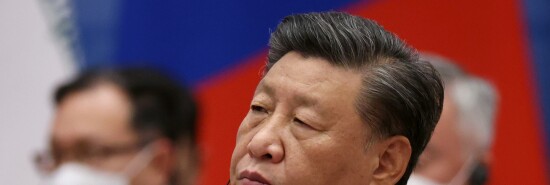
China is a minefield for international creditors
Daniel Jia
Video Embed
This month in China, a rumor spread that the founder and chairman of Chinese real estate developer Evergrande had jumped off a building to take his own life. Subsequent reports indicate that Hui Ka Yan’s “suicide” was staged. Either way, it would not be surprising if the “death news” were true. Evergrande, once China’s largest developer by sales volume, has been in free fall all year. Its Hong Kong-listed stock is below a dime (as of Dec 9, 2022), down from $4 at its peak. Hui’s personal wealth has shrunk from $36 billion to $3 billion.
Evergrande came under the spotlight in December 2021 after it defaulted on $1.2 billion offshore bonds, which account for merely 1% of its enormous debt liabilities (approximately $300 billion equivalent at the end of 2021). Of its total debts, $20 billion is held offshore.
BRIDGEWATER, KKR, AND BLACKROCK’S SUPPORT FOR COMMUNIST CHINA IS DEEPLY UNPATRIOTIC
The Chinese government took over the company’s debt restructuring, with the chief goal being to avoid social instabilities that stemmed from Evergrande’s failure. Foreign creditors are not on the list of concerns because they would not make a noise.
Many argued that Evergrande is too big to fail, so the Chinese government would eventually throw it a buoy. But they could not be more wrong.
The Chinese government is struggling to survive revenue shortfall when three-year-long pandemic mismanagements take a toll on its economy. There is simply no spare fund for a private company whose collapse is only a matter of time. Even if the government had the resources, an Evergrande rescue would encourage thousands of Evergrande-in-the-making to follow suit — that is, borrow to expand and default to be rescued.
Evergrande’s debt-restructuring team has pushed its international investors to trade in the offshore debts for the company’s overseas assets, such as an electric vehicle plant. The problem is that the offshore assets offered are worth only a fraction of the owed debts, even on paper. Their real value could be much smaller. As a proof of concept, Evergrande’s EV unit was just shut down for lack of viability. Trading one dead investment for another would be of little relief to international investors’ loss.
Evergrande is not the only Chinese entity to default on offshore debts, nor is China’s real estate section the only minefield where international investors have been trapped in. By early December 2021, Chinese corporations had already defaulted on more than $10 billion in overseas bonds in that year alone, with only one-third coming from the red-flagged real estate sector. Those defaulters likely shared the same expand-with-debt growth and defer-until-default strategies as Evergrande.
But if China’s offshore defaults looked bad in 2021, the situation in 2022 was much worse. During the first half of this year, 85% of China’s bond defaults were offshore. This is a siren announcing the arrival of a tsunami that could wipe out everything that international investors have put into China’s entities if China’s relationships with major economies fail to improve.
China’s outstanding offshore corporate debts stood at approximately $870 billion at the beginning of this year, or about 80 times its 2021 offshore defaults. The Chinese government has urged companies to “optimize foreign debt structure.” The core of these instructions is “debt rollover,” a tactic deceitfully deployed in China’s domestic debt market for decades.
These borrow-first-default-later attitudes are bad, but the drive underneath is uglier: The Chinese government might see those offshore debts as a threat to its own foreign reserves. Although China has the largest foreign reserves (approximately $3 trillion), over half of that is from foreign direct investments, which need to be paid out when the investments leave China, as many are doing already. And so if the $870 billion offshore corporate debts are to be fully serviced, China would have only $500 billion worth of foreign reserves left, not enough to cover 10 months of import needs.
With its foreign reserves coffer shrinking due to the loss of export steam, offshore debt repayments would be a drain on China’s foreign reserves. That is why the Chinese government actively encourages firms to roll over their overseas debts and may even be quietly encouraging defaults.
China’s Evergrande and the like are deploying the defer-and-default tactic on their offshore debt obligations while the Chinese government downplays the looming danger awaiting international creditors. While the international creditors are thrilled to find the too-good-to-be-true high returns for their investments in China projects, the Chinese government and corporations have already booked the incoming capital as their own fortune.
After this $870 billion in offshore corporate bonds, China has another $800 billion in sovereign bonds waiting in line for default. International investors may decide it’s time to cut their losses.
CLICK HERE TO READ MORE FROM THE WASHINGTON EXAMINER
Daniel Jia is the founder of consulting firm DJ Integral Services. He writes analytical reports on public-related matters, with a special focus on China-related cultural and political issues. There is no conflict of interest to be disclosed.
